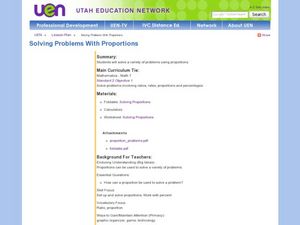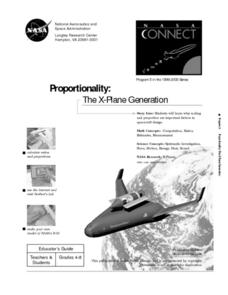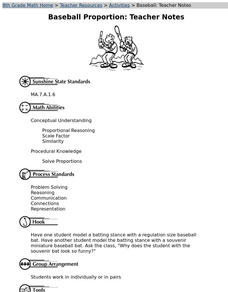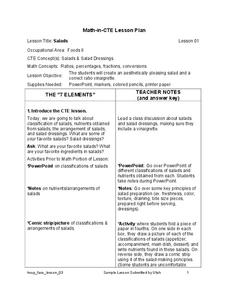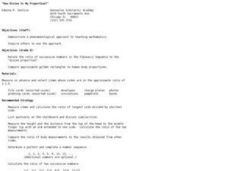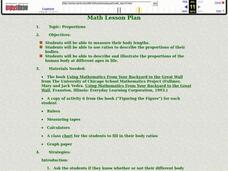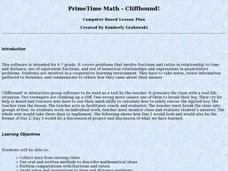Curated OER
Proportions in Stories
Students solve problems dealing with ratios and proportions. In this algebra instructional activity, students rewrite word problems using equations and symbols. They correctly convert between percents and decimals.
Curated OER
Ratios
Sixth graders investigate the concept of ratios and how they can be used to represent the comparison of quantities. The lesson is taught using a table or graph to compare two categories of data.
Curated OER
Introduction To Ratios
Students engage in a lesson that is involved with ratios. They use the jigsaw in order to actively take part in the lesson. Students play the game with the ratio puzzle pieces. The puzzle is completed while using the follow up exercises.
National Research Center for Career and Technical Education
Information Technology: Photoshop Scale
Scaling is a practical skill as well as a topic to be addressed throughout the Common Core math standards. You are given three different presentations and a detailed teacher's guide to use while teaching proportion, as well as practice...
Curated OER
How Fast is Usain Bolt?
Revisit the 2012 Summer Olympics by having seventh graders calculate the unit rate sprinting speed of the 100-meter gold medal winner.
Curated OER
Skittle Math
In this skittle math worksheet, young scholars sort skittles by color and create a bar graph for each color of skittle. Students also answer comparison, ratio, and relationship questions about the skittles.
Curated OER
Solving Problems with Proportions
Seventh graders explore the concept of proportions. In this proportion lesson, 7th graders play a review game involving whiteboards. Students work in groups to solve a given proportion the fastest. Students also work in pairs to solve...
Curated OER
Proportionality: The X-Plane Generation
Students meet NASA researchers who describe the relationship between force, energy and motion. They discuss how NASA's experimental X-plane is being tested to make space travel more reliable and show how proportionality and ratios are...
Curated OER
Jazz and Math: The Beat Goes On
Learners collect real data through listening, counting and timing jazz pieces.They use ratios, rates, and proportions to report collected data and demonstrate an understanding of the concepts of rhythm and tempo in music.
Curated OER
Solve for Scale Factors Using Proportions
Eighth graders solve problems using proportions with scaled drawings. They work with maps and blue-prints discussing scales and plans and examine different polygons and figure out the scale factors or proportions they have been changed by.
Curated OER
Proportion Problems
Seventh graders explore the concept of proportions. In this proportions lesson, 7th graders determine which offer is the better deal given two pizza offers. Students use cross products to solve proportions. Students write directions...
Curated OER
Baseball Proportion
Eighth graders measure regular baseball bats and souvenir bats in centimeters. They determine how tall a person would be to be in proportion to the souvenir bat, create a poster depicting the person, and explain the proportional...
Curated OER
Shots, Standings, and Shopping
Rates and ratios can easily be applied to real-world situations. Learners explore a series of websites in order to procure comparable data. They define ratios and rates, view videos, and use the internet to explore how ratios and rates...
Curated OER
Australian food
Use ratio and proportions to adjust recipe size. Middle schoolers investigate Australian food and adjust the recipe size for said foods according to the given situation. They then prepare Australian foods.
National Research Center for Career and Technical Education
Salads
Lettuce talk for a moment about your culinary scholars; do they have what it takes to create a great salad? Show them the finer points of salad preparation with a career and technology lesson that combines direct instruction, creativity,...
Curated OER
"How Divine Is My Proportion?"
Eighth graders explore the concept of the divine proportion/golden ratio. In this Fibonacci Sequence exploratory lesson, 8th graders measure the length and width of various objects to see which items have a divine proportion. Students...
Curated OER
Proportions
Young scholars study proportions. In this mathematics lesson, students measure their body length, head length, and ratio of their body, write their findings on a group chart, and discuss how a person's head size or arm span are in...
Curated OER
Proportional Segments Between Parallel Lines
Students identify similar triangles. For this proportional segments lesson, students identify corresponding sides, set up ratios, and find the length of the missing side of a triangle. They use the parallel/proportionality...
Curated OER
Are You a Golden Ratio?
Students explore the concept of the golden ratio in nature and architectural design. They discuss examples such as petals on a sunflower and the Parthenon. In small groups they take turns measuring their body parts to find a golden ratio.
Curated OER
Applications, Proportions, and Problem Solving
In this math worksheet, students find the solutions to the problems involving proportions. They also compare the similar triangles.
Curated OER
PrimeTime Math: Cliffbound!
Young scholars are involved in a cooperative learning environment that analyzes fractions, ratios to time and distance, equivalent fractions and numerical relationships and expressions in quantitative problems. They take notes, relate...
Curated OER
Paying for Crime
Students participate in activties examining ratios and proportions. They use graphs to interpret data showing the government's budget for prisons. They present what they have learned to the class.
Illustrative Mathematics
Finding a 10% increase
A quick problem to test your mathematicians' knowledge on percent increase. Two different solutions are provided, mental math and computing. Ask your learners to include a description of what they did to supplement their answer.
Curated OER
Frame Yourself
Young ratio masters calculate and cut a frame (out of poster board) to accurately create an even frame around a picture of themselves. The frame needs to be proportional to the picture with constraints determined by the instructor.






